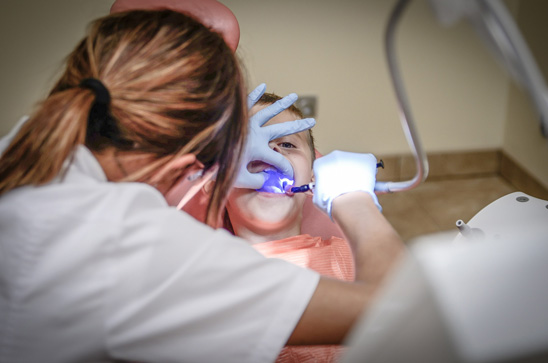
Parents play maybe the most important role in development of teeth hygiene of their children. They are the first educators in the sense of maintaining hygiene, healthy habits and choosing the right food. Some people are wondering how to provide the best experience to their children during the first visit to the dentist. The solution is clear. Prepare your child. These are 6 pieces of advice about the steps that each parent has to make before the child's first dental experience.
1. Explain to the child who the dentist is
Children do not have a picture about who the dentist is and what is he doing. Some might have seen him once, but most of them have not had any experience with him. How to explain to the children what a dentist is? Use their imagination. Let them examine their own teeth at the mirror while imagining someone who takes care of their teeth. A dentist usually wears a white coat, he has all necessary equipment and he is patient with everyone. This is an ideal picture. If you have some toys that look like dental equipment, the things are becoming easier. The child will have a picture how dental tool looks like and that is the point of the game. If there is some doll around, the child can play with it and "fix" the teeth of the toy. The fun is guaranteed. Be the part of the game and try to provide the most realistic picture about the dentist's job.
2. Take your child to the dentist after growing the first teeth
Dental hygiene starts in very young age. First years of life are the best time for starting with good habits. In the case of the most children, first teeth are growing around eleventh month and that is the time when a parent has to organize the first meeting with the dentist. He will check the teeth, examine the development of the jaw and discover what the child's habits are. Sucking the finger or biting the lips could be some bad habits. Early discovering of these habits is the job of parents, because they spend the most time with their children. If necessary, the dentist will clean the teeth and provide the small lesson about maintaining the right hygiene.
3. There are health benefits of regular dental meetings
During the first visit to the dentist, he will explain to the child why is brushing teeth so important and how to do it right. Removing food leftovers is the most important, because it is the way of protecting all teeth. Adequate teeth brushing should be learned after growing the first teeth and the habit should be there during the whole life. In addition to the right hygiene, visiting the dentist is necessary. He will check the condition of all teeth while giving the advice about health maintaining.
4. Support your child
Most dentists will let you be next to the child during the first visit. Some children could be scared of all those devices all over the place, but you are there to support them. The dentist and the parent together can help the child to relax. Prepare your toddler before the situation and explain that the pain will be minimal. Try to add a hint of fun to everything, so the child could be relaxed in the right way. If necessary, hold his hand and try to encourage him with some nice words.
5. The child is learning from parent's behavior
Watching is the best way of learning. Things that you do as a parent are serving as a lesson to your children. For that reason, make an appointment for both your child and yourself. Of course, you are the first on the stage. If you are relaxed enough, the child will see that there is no reason for fear. Be still on the chair and show some courage. Your example will give confidence to the child. Everything will seem interesting, especially if you show some relaxed approach. The child will try to imitate you.
6. Building good habits as a goal
The main point of all these pieces of advice is to teach your child what good habits are. If you do it with patience and love, the results will be positive. Over the time, good habits will become a standard. You are there to make the child feel relaxed and interested. The first dentist visit could be a great experience worth of remembering.

Nov 13 2016

Nov 15 2016